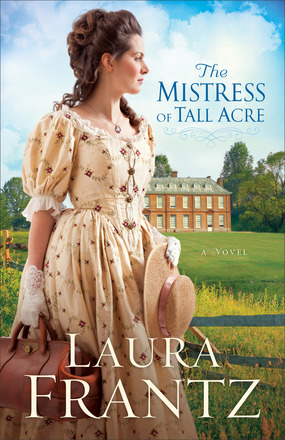 In another colonial masterpiece, Laura Frantz tells a story of the reconstruction following the American Revolution. Sophie Menzies, daughter of a Tory who fled to Scotland at the beginning of the war, is nearly destitute by the time word arrives of the war's end. An outcast in spite of her own personal Patriot leanings, she is waiting for her brother to come home and reclaim their moldering estate. Instead, her nearest neighbor, widower General Seamus Ogilvy, suddenly reappears with his daughter. After one chance encounter with Lily Cate, Sophie becomes a friend and buffer between them, as the long-absent father reacquaints himself with the child he's only briefly met. When mysterious figures appear in the night and Seamus' in-laws fight for custody of the child, Seamus knows he must do something to protect his child, and his lovely neighbor, who is already firmly entrenched in Lily Cate's affections, may just hold the answer.
In another colonial masterpiece, Laura Frantz tells a story of the reconstruction following the American Revolution. Sophie Menzies, daughter of a Tory who fled to Scotland at the beginning of the war, is nearly destitute by the time word arrives of the war's end. An outcast in spite of her own personal Patriot leanings, she is waiting for her brother to come home and reclaim their moldering estate. Instead, her nearest neighbor, widower General Seamus Ogilvy, suddenly reappears with his daughter. After one chance encounter with Lily Cate, Sophie becomes a friend and buffer between them, as the long-absent father reacquaints himself with the child he's only briefly met. When mysterious figures appear in the night and Seamus' in-laws fight for custody of the child, Seamus knows he must do something to protect his child, and his lovely neighbor, who is already firmly entrenched in Lily Cate's affections, may just hold the answer.If there is one thing I've come to expect from a novel by Laura Frantz, it is rich, strong storytelling, to the point that the back cover blurb rarely does justice to the story--there is so much more going on than the short description conveys. Actually, I was halfway through the book when I reread the blurb, wondering if it was even for the same story; up through that point, they had little in common. (The above description is my own, being accurate yet less spoiler-ish.) But regardless of the quality, there is so much more depth and emotion than a mere description can possibly convey. From hope to despair, tenderness to frustration, joy to the sensation of being sucker-punched--it's an emotional journey you don't want to miss.
I enjoyed the history behind the story and how Frantz captures the upheaval following the war--anti-British sentiments still running high, the government in the process of establishment, and people still recovering from the wounds of war. When I think of southern plantations, the Civil War springs first to mind, but many of these estates were already well established at the time of the Revolution, and thus, as this novel proves, the issue of slavery was already a point of contention, even then.
The story was enthralling, the descriptions beautiful; the characters well drawn, and the romance deep yet clean. 5 out of 5 stars!
Thank you Revell for providing a free novel in exchange for a review. I was not required to make the review positive, and all opinions are my own.
No comments:
Post a Comment